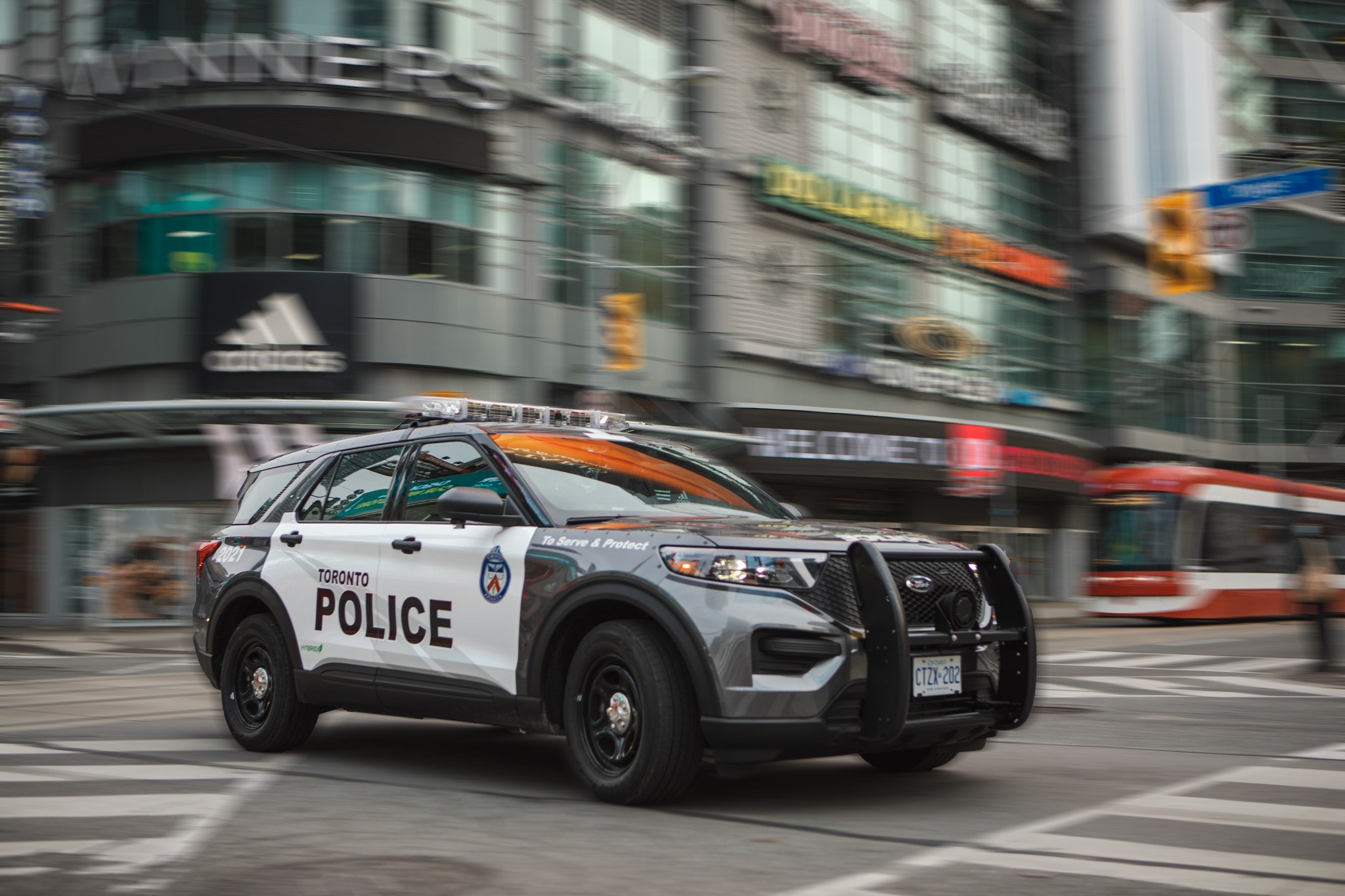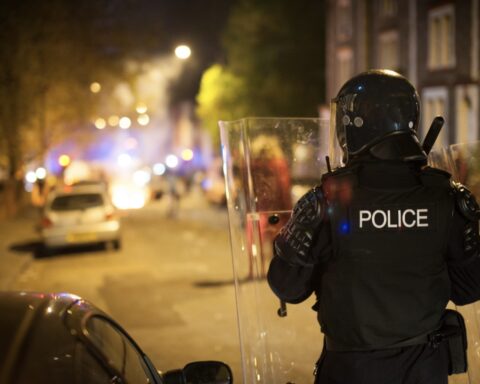The afternoon of June 15, I sat on the front steps of my house speaking to a Toronto Police officer. I was reporting an incident, he was taking my statement. The officer was courteous; he identified and introduced himself, made good eye contact, walked me through the procedure, talked to me about the body camera, and asked if I had any questions before we got started. We even shared a few laughs.
But I was nervous the entire time — I instinctively checked for his badge and what was on his police belt.
Earlier that day, Toronto’s interim Police Chief, James Ramer, apologized to the city’s racialized communities in response to a damning report released by the force itself. The report confirmed what racialized communities have said for decades, that systemic racism is prevalent within one of this country’s largest — and best-funded — municipal police forces.
Its findings showed that Black, Indigenous and Middle Eastern people were overrepresented in the number of “enforcement actions” taken against them relative to their total population in Toronto. That includes arrests, provincial offences tickets, cautions and diversions. When it came to Black residents it was by a factor of 2.2.
When it came to use of force, Black, Latino, East/Southeast Asian and Middle Eastern people were overrepresented by factors of 1.6 times, 1.5 times, 1.2 times and 1.2 times, respectively.
Indigenous people are the most likely to be subjected to a police strip search — a practice that’s been called “cruel”, “inhumane” and the Supreme Court of Canada deemed “inherently humiliating and degrading,” in 2001.
Police also tended to use more force against racialized groups more often compared to white people, especially when it came to officers drawing their firearms.
The police’s apology acknowledges these realities but doesn’t do much else.
‘We don’t accept your apology’
When considered within the wider histories between Black and Indigenous communities and the police, the data is even more insidious. The report is further indication that the police view those people as inherently more dangerous and less worthy of rights than other populations.
Critics of the report argue that the data from this report shouldn’t be considered in isolation. Previous reports have shown that racialized, and in particular Black people, are more likely to be stopped (and carded when that was still legal), more likely to be charged and receive a harsher sentence, and more likely to be killed by police than white people.
“As an organization, we have not done enough to ensure that every person in our city receives fair and unbiased policing,” Ramer said during the press conference.
During the press conference, University of Toronto professor and member of “No Pride in Policing” Beverley Bain, proclaimed that this isn’t what we asked for. Bain called Ramer’s apology a “public relations stunt” that’s “insulting” to Black and Indigenous people.
“This is not about saving our lives. What we have asked for you to do is stop. To stop brutalizing us. To stop killing us,” she said.
She’s right. What we got is an admission of guilt without a plan or any real indication of change forthcoming. To me, it wasn’t a proper apology. It’s like when you have a fight with a sibling and your parents force you to make up; it’s not an apology you can confidently trust.
If the police, and Torontonians take the report’s findings seriously, it could lead to meaningful change. But again, I can’t confidently trust that that’s what’ll happen.
Action and accountability
That said, the apology and the report are not meaningless. Two expressions I’ve heard revolving discussions about this situation are “what gets measured gets changed” and “no data, no problem, no solution.” They’re excellent points, it’s hard to address a problem if it’s not recognized as one. It’s also significant that this data comes directly from the police; there can be no questions about its legitimacy.
Yes, it helps that we know so much about the problem but if police aren’t willing to address it then what good is that data?
For years Toronto Star journalists have tried to get similar data but the police didn’t want to cooperate. Now that the data is publicly available, the Toronto Police Service appears unwilling to act on it. Ramer apologized “unreservedly” and said “We must improve and we will do better.” The thing is, there are reservations and there aren’t clear indications that the police will do better.
Ramer said the report was only intended to highlight systemic racism and biases in policing. So, data from the report is anonymized and won’t be used to identify officers’ “individual acts of racism.” He explained that those are instances of misconduct and that the force has alternate ways of dealing with them.
But I’m skeptical of whatever methods they have in place because clearly, they’ve never worked.
The Special Investigations Unit, the independent body tasked with policing the police, only laid charges in 3 per cent of the 397 cases dealing with injuries, death and sexual assault between April 2020 and March 2021. Fourteen officers were charged.
The message from Ramer to his fellow Toronto Police employees: “I want you to know that this is an organizational shortcoming and it does not speak to your actions as individual police officers and civilian members.”
That’s more reassuring to officers than it is to the public, notably the racialized communities subjected to racism. Officers need to be held accountable. I shouldn’t have to say that but here we are.
The impression I got from the apology is that the Toronto Police Service prioritizes protecting the livelihoods of its members more than protecting the lives of the people they’re sworn to serve and protect. The anonymization of the data lets police officers hide behind actions they should feel shame for and more importantly, allows them to avoid consequences. It’s not as if the police aren’t capable of doing that kind of investigative work.
What we’ve learned from the report is that systemic racism is definitely due in part to organizational shortcomings. And the data certainly doesn’t speak to the conduct of each individual member. But for the interim Police Chief to denounce systemic racism and in the same breath essentially absolve every officer, including ones who have been racist, from any kind of responsibility is delusional, disingenuous and problematic.
Reimagining the police
Ramer deserves some credit for naming systemic racism as a factor in the negative police outcomes that we’re seeing. But apparently, no one is to blame.
Notisha Massaquoi is an assistant professor at the University of Toronto. She was co-chair of the anti-racism advisory panel of the Toronto police board and spent three years developing the force’s race-based data collection policy. She argues against differentiating between systemic and individual racism.
“You cannot have systemic racism in an organization if it is not supported by racist people, racist policies, racist values, racist attitudes and racist behaviours.”
With systemic racism, if a system is inherently racist, even people operating within the system who aren’t racist end up doing racist things. But, it’s also true that racist people and beliefs informing the decisions on how the system operates alongside blatantly racist acts by individuals within the system contribute to it being racist. So, to effectively combat systemic racism it’s vital to address the structure and culture of the institution and deal with the “bad apples” within it.
Ramer told reporters, “I’d be really concerned about if everything officers were doing, they were always being identified because I think what would happen is they would become less likely to engage.”
Exactly. That’s the point. When people say “defund the police” what they’re calling for is the removal of police from many of the situations they’re in now in order to achieve better outcomes.
His response suggests that he’s not in favour of officers being more mindful in their interactions with racialized people. Which doesn’t make sense to me.
As a journalist in the age of media mistrust and disinformation, I’m hypervigilant when it comes to things like sources, and I think it makes for better journalism. Yes, it takes longer but what people really want is the job done right (especially when Toronto’s police budget and the stakes are so high). I understand that policing is not like journalism and there are more dangers and quick decisions to be made but that’s not an excuse. Nor does that apply to most of the situations police officers currently find themselves in.
Last year, I spoke to author and University of Toronto professor, Rinaldo Walcott, about a program designed in collaboration with the Toronto Police Service meant to inform the public about their legal rights and the responsibilities of police officers during encounters with the goal of achieving better outcomes.
Walcott is critical of the program and of policing writ large and calls for its abolition. He argued that it’s been around so long, and plays such a big role in our culture that it appears legitimate and necessary even though it isn’t. Walcott admitted his disappointment in the direction of the conversations he heard following the death of George Floyd and the guilty verdict for the officer who killed him, Derek Chauvin.
“So much of it was actually about maintaining policing as a structure in our lives. Rather than thinking about that verdict as yet another example of why policing is a violent institution, and one that we should be putting our heads together to figure out how to create a world where we don’t need it.”
I worry the same could happen in the wake of this latest report. And that we’ll get into another cycle of report, apology, review, hiring, training and back. All that does is erode trust.
Going back to my police situation, I couldn’t fully trust or feel safe interacting with a police officer who I called to my house, in broad daylight. I also couldn’t fully trust the police to deal with the other person, a fellow Black male, in a way that upholds his rights. That shouldn’t be the case.
The report and the apology helped move the conversation and bring us closer to a solution. Without comparing tragedies too much, this report reminds me of last year’s “discoveries” of unmarked graves at former residential school sites. Acknowledging the problem, and its scale for what it is, the institutions responsible apologizing, and the consequent re-evaluation of the virtuosity of these concepts (policing and Canada) absolutely matter. But the action that follows is more important.
Marcus is a poet, editor and freelance journalist based in Toronto. He currently works with New Canadian Media as an Editor and as a Freelance Writer for ByBlacks.com, The Edge: A Leader's Magazine and The Soapbox Press.




